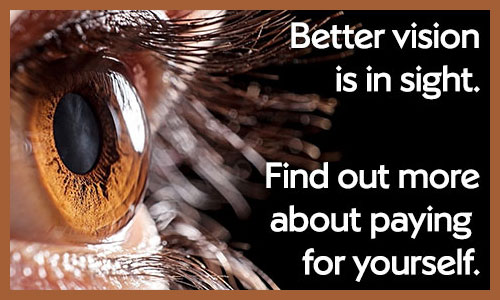4 ways to help prevent cataracts
- Overview
All too often, time is all that's needed for cataracts to develop. Like any other part of the body, decades of use and exposure can cause deterioration. The changes are small at first, so little you won't even notice. But as time goes on your risk of developing different types of cataracts will inevitably rise and you may start to experience common symptoms of cataracts.
If you already have cataracts, we can provide cataract surgery to replace the lens inside your eye where they develop. But that doesn't mean you have to sit around waiting for cataracts to start impacting the things you love. You can't control everything, but here are four things you can do to potentially reduce your risk.
1. Wear sunglasses
When too much UV light tries to enter your eye, your body will instinctively try to prevent it. Why? Because focusing too much light through your lens and onto your retina can be extremely damaging to the eye. Not only has overexposure been linked to cataracts, but developing other eye conditions can also increase your risk.
On bright sunny days, wear sunglasses and a wide-brim hat. Your eyes will thank you for it. Don't try to read under harsh light and never ever stare at the sun.
2. Maintain a healthy weight
Obesity has been linked to all sorts of diseases including cataracts. The reason for the link is unclear, but researchers believe being overweight affects the quality of blood flowing to the eye, presenting an opportunity for early deterioration.
Being overweight can also cause you to develop Type 2 diabetes. Again, the mechanisms aren't clear, but research suggests people with diabetes are more likely to develop cataracts at a younger age. Stay active and eat well to keep your eyes healthy. Find out more about diabetic eye disease.
3. Exercise caution

Eye injuries can bring on cataracts suddenly or cause them to develop later in life.
Wear safety goggles when in a situation or environment that could expose your eyes to chemicals, sparks, sharp objects and explosions - even minor ones. This is especially important if you work regularly in these challenging environments.
4. Mind the meds
Taking prescribed medication is an important part of staying healthy, and in most cases the benefits greatly outweigh the risks. However, taking steroid-based medication over long periods of time, especially in high doses, is thought to be the most common drug-related cause of cataracts. Check with your healthcare professional that you're on the right dose.
Interested in cataract surgery?
Fill in the form below and we'll get back to you within one working day. If it's urgent, you can call us on 0300 123 6200.
Thank you
A member of the team will respond to you soon.
Last updated Friday 28 May 2021
First published on Thursday 18 February 2016


